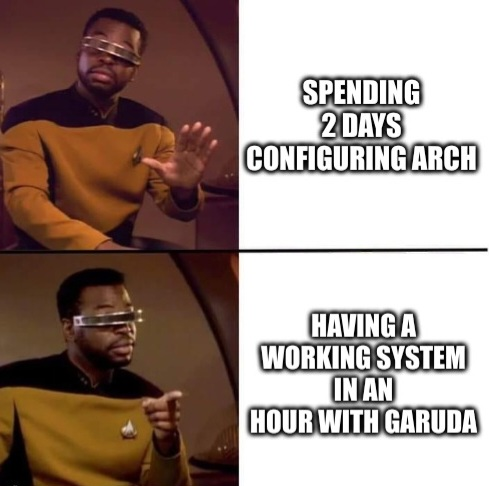this post was submitted on 27 May 2024
369 points (88.0% liked)
linuxmemes
22432 readers
2201 users here now
Hint: :q!
Sister communities:
Community rules (click to expand)
1. Follow the site-wide rules
- Instance-wide TOS: https://legal.lemmy.world/tos/
- Lemmy code of conduct: https://join-lemmy.org/docs/code_of_conduct.html
2. Be civil
- Understand the difference between a joke and an insult.
- Do not harrass or attack users for any reason. This includes using blanket terms, like "every user of thing".
- Don't get baited into back-and-forth insults. We are not animals.
- Leave remarks of "peasantry" to the PCMR community. If you dislike an OS/service/application, attack the thing you dislike, not the individuals who use it. Some people may not have a choice.
- Bigotry will not be tolerated.
- These rules are somewhat loosened when the subject is a public figure. Still, do not attack their person or incite harrassment.
3. Post Linux-related content
- Including Unix and BSD.
- Non-Linux content is acceptable as long as it makes a reference to Linux. For example, the poorly made mockery of
sudoin Windows. - No porn. Even if you watch it on a Linux machine.
4. No recent reposts
- Everybody uses Arch btw, can't quit Vim, <loves/tolerates/hates> systemd, and wants to interject for a moment. You can stop now.
5. 🇬🇧 Language/язык/Sprache
- This is primarily an English-speaking community. 🇬🇧🇦🇺🇺🇸
- Comments written in other languages are allowed.
- The substance of a post should be comprehensible for people who only speak English.
- Titles and post bodies written in other languages will be allowed, but only as long as the above rule is observed.
Please report posts and comments that break these rules!
Important: never execute code or follow advice that you don't understand or can't verify, especially here. The word of the day is credibility. This is a meme community -- even the most helpful comments might just be shitposts that can damage your system. Be aware, be smart, don't remove France.
founded 2 years ago
MODERATORS
you are viewing a single comment's thread
view the rest of the comments
view the rest of the comments

I think the fundamental issue here is that you conflate the concepts of reliablility and stability. Those are not the same. Stability in distros is a question of how much they restrict change during support cycles in order to not be a moving target for developers and system integrators. Fundamentally a rolling release can't be stable. It can absolutely be reliable to use, but you wouldn't use it as a basis for an embedded system you're trying to develop.
I've heard the counter argument from developers that jumping from a two to four years old codebase is an absolute nightmare to deal with and moving to a rolling release means not dealing with the burden of migrating over to a newer version and implementing small patches when needed.
Entire fixes, features, and upgrades miss the deadline and have to wait because of a process like this. It's still a moving target but on a different scale. They try to roll the newest packages possible into the release meaning the majority of the bug fixing and testing happens mere months before release.
It's also a burden on bigger teams especially when they build their own automations and tooling. why Google devs moved to a rolling release.
It's a solid concept but so much changes all at once it's a big project to migrate to a newer version. It frontloads a lot of the work sometimes to the point of delaying support for the newer version. Unless you build for Debian unstable and work backwards from there (basically rolling) but doesn't guarantee back ports don't break the software.
It only benefits users who need a set it and forget it solution. I chose it for my server because I don't want to touch it but I dread the day I have to upgrade the whole system and something small like the zfs filesystem, docker, or my samba setup suddenly has issues and makes it unbootable like that kernel update that bricked my Nvidia drivers a couple months ago. I'm hoping that's a fluke because it happened at the worst time for me.
It's four years from now, I don't have to think about it yet.